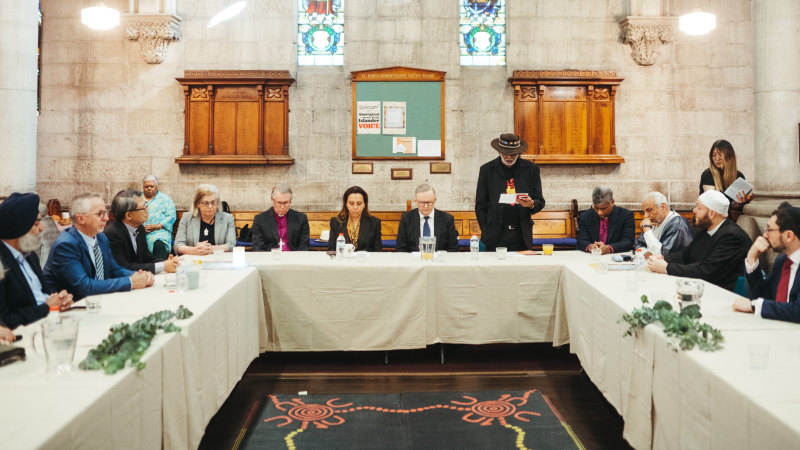Save articles for later
Add articles to your saved list and come back to them any time.
Hundreds of Islamic leaders will tell their communities to vote for the Voice as a way to bring Australia closer to peace and justice, launching the message after calls from other faith groups and ethnic communities to back the change.
The move steps up the Yes campaign in a key community ahead of the final week of early voting, with Prime Minister Anthony Albanese expected to attend a mosque in western Sydney on Friday to hear the message.
The Australian National Imams Council has agreed on the message and asked all imams and other speakers to dedicate their Friday address, or khutbah, to the call to support the recognition of First Australians and setting up the Voice.
Faith roundtable hosted by the Yes23 campaign where a gathering of different religious heads talk about the upcoming referendum, at the St John’s Anglican Church in Glebe.Credit: Dion Georgopoulos
The Voice has formal support from many peak groups, ranging from the Executive Council of Australian Jewry to the Anglican Church, the Uniting Church, the Hindu Council and the National Sikh Council of Australia, although there have been tensions over some church stances.
The message to be delivered at mosques on Friday has the support of the Grand Mufti of Australia, Ibrahim Abu Mohamed, as well as the president of the Australian National Imams Council, Sheikh Shadi Alsuleiman.
The latest census found there were more than 800,000 followers of Islam in Australia, about 3 per cent of the population. The imams’ council expects the new message to be preached at 80 per cent or more of the nation’s 250 mosques.
“The Voice will contribute to shaping a positive future for all Australians, and Australian Muslims should be a part of this significant change,” says the message, which is recommended to imams to include in their sermons.
“It is essential to acknowledge that the First Nations people, Aboriginal and Torres Strait Islander tribes, were the first sovereign nations of the Australian continent and its adjacent islands for thousands of years.”
Linking the issue to the Islamic faith, the sermon says the Prophet Muhammad had a key message for followers about “supporting the weak, helping the oppressed, and spreading peace” and this meant advocating for those who needed and deserved help.
With polls showing majority support for a No vote, the Yes23 campaign has been seeking to mobilise local groups to swing support towards change before ballots are counted on October 14, with faith and ethnic groups seen as key to this outcome.
But Opposition Leader Peter Dutton has also made a direct plea to Australians from migrant backgrounds to vote against the Voice, saying it would divide people by their ancestry and undermine equality for multicultural communities.
The Victorian Women’s Trust funded a message in favour of the Voice to Chinese, Vietnamese, Greek and Italian communities earlier this week, while the proposal gained formal support from 120 peak ethnic groups in May.
While some faith leaders urge a Yes vote, some peak groups are choosing a middle path on the question.
The Australian Catholic Bishops Conference issued a statement at the end of September saying the questions about the proposal were “moral and ethical” as well as political.
“We need to see the truth of what Aboriginal and Torres Strait Islander peoples have suffered and the disadvantage many experience to this day. Justice demands that we seek to rectify this disadvantage,” the bishops wrote.
However, they did not give advice to people about whether they should vote Yes or No.
Cut through the noise of federal politics with news, views and expert analysis. Subscribers can sign up to our weekly Inside Politics newsletter.
Most Viewed in Politics
From our partners
Source: Read Full Article

